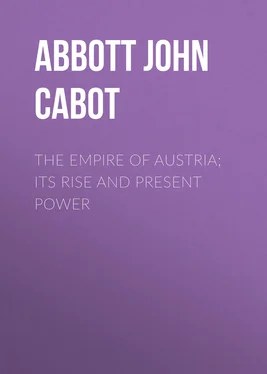John Abbott - The Empire of Austria; Its Rise and Present Power
Здесь есть возможность читать онлайн «John Abbott - The Empire of Austria; Its Rise and Present Power» — ознакомительный отрывок электронной книги совершенно бесплатно, а после прочтения отрывка купить полную версию. В некоторых случаях можно слушать аудио, скачать через торрент в формате fb2 и присутствует краткое содержание. Жанр: Путешествия и география, История, foreign_edu, foreign_antique, foreign_prose, на английском языке. Описание произведения, (предисловие) а так же отзывы посетителей доступны на портале библиотеки ЛибКат.
- Название:The Empire of Austria; Its Rise and Present Power
- Автор:
- Жанр:
- Год:неизвестен
- ISBN:нет данных
- Рейтинг книги:3 / 5. Голосов: 1
-
Избранное:Добавить в избранное
- Отзывы:
-
Ваша оценка:
- 60
- 1
- 2
- 3
- 4
- 5
The Empire of Austria; Its Rise and Present Power: краткое содержание, описание и аннотация
Предлагаем к чтению аннотацию, описание, краткое содержание или предисловие (зависит от того, что написал сам автор книги «The Empire of Austria; Its Rise and Present Power»). Если вы не нашли необходимую информацию о книге — напишите в комментариях, мы постараемся отыскать её.
The Empire of Austria; Its Rise and Present Power — читать онлайн ознакомительный отрывок
Ниже представлен текст книги, разбитый по страницам. Система сохранения места последней прочитанной страницы, позволяет с удобством читать онлайн бесплатно книгу «The Empire of Austria; Its Rise and Present Power», без необходимости каждый раз заново искать на чём Вы остановились. Поставьте закладку, и сможете в любой момент перейти на страницу, на которой закончили чтение.
Интервал:
Закладка:
Many of the German princes now followed the example of John of Saxony, and openly avowed their faith in the Lutheran doctrines. In the Austrian States, notwithstanding all Ferdinand's efforts to the contrary, the new faith steadily spread, commanding the assent of the most virtuous and the most intelligent. Many of the nobles avowed themselves Lutherans, as did even some of the professors in the university at Vienna. The vital questions at issue, taking hold, as they did, of the deepest emotions of the soul and the daily habits of life, roused the general mind to the most intense activity. The bitterest hostility sprung up between the two parties, and many persons, without piety and without judgment, threw off the superstitions of the papacy, only to adopt other superstitions equally revolting. The sect of Anabaptists rose, abjuring all civil as well as all religious authority, claiming to be the elect of God, advocating a community of goods and of wives, and discarding all restraint. They roused the ignorant peasantry, and easily showed them that they were suffering as much injustice from feudal lords as from papal bishops. It was the breaking out of the French Revolution on a small scale. Germany was desolated by infuriate bands, demolishing alike the castles of the nobles and the palaces of the bishops, and sparing neither age nor sex in their indiscriminate slaughter.
The insurrection was so terrible, that both Lutherans and papists united to quell it; and so fierce were these fanatics, that a hundred thousand perished on fields of blood before the rebellion was quelled. These outrages were, of course, by the Catholics regarded as the legitimate results of the new doctrines, and it surely can not be denied that they sprung from them. The fire which glows on the hearth may consume the dwelling. But Luther and his friends assailed the Anabaptists with every weapon they could wield. The Catholics formed powerful combinations to arrest the spread of evangelical views. The reformers organized combinations equally powerful to diffuse those opinions, which they were sure involved the welfare of the world.
Charles V., having somewhat allayed the troubles which harassed him in southern Europe, now turned his attention to Germany, and resolved, with a strong hand, to suppress the religious agitation. In a letter to the German States he very peremptorily announced his determination, declaring that he would exterminate the errors of Luther, exhorting them, to resist all attacks against the ancient usages of the Church, and expressing to each of the Catholic princes his earnest approval of their conduct.
Germany was now threatened with civil war. The Catholics demanded the enforcement of the edict of Worms. The reformers demanded perfect toleration—that every man should enjoy freedom of opinion and of worship. A new war in Italy perhaps prevented this appeal to arms, as Charles V. found himself involved in new difficulties which engrossed all his energies. Ferdinand found the Austrian States so divided by this controversy, that it became necessary for him to assume some degree of impartiality, and to submit to something like toleration. A new pope, Clement VII., succeeded the short reign of Adrian, and all the ambition, intrigue and corruption which had hitherto marked the course of the court of Rome, resumed their sway. The pope formed the celebrated Holy League to arrest the progress of the new opinions; and this led all the princes of the empire, who had espoused the Lutheran doctrines, more openly and cordially to combine in self-defense. In every country in Europe the doctrines of the reformer spread rapidly, and the papal throne was shaken to its base.
Charles V., whose arms were successful in southern Europe, and whose power was daily increasing, was still very desirous of restoring quiet to Europe by reëstablishing the supremacy of the papal Church, and crushing out dissent. He accordingly convened another diet at Spires, the capital of Rhenish Bavaria, on the 15th of March, 1529. As the emperor was detained in Italy, his brother Ferdinand presided. The diet was of course divided, but the majority passed very stringent resolutions against the Reformation. It was enacted that the edict of Worms should be enforced; that the mass should be reëstablished wherever it had been abolished; and that preachers should promulgate no new doctrines. The minority entered their protest. They urged that the mass had been clearly proved to be contrary to the Word of God; that the Scriptures were the only certain rule of life; and declared their resolution to maintain the truths of the Old and New Testaments, regardless of traditions. This Protest was sustained by powerful names—John, Elector of Saxony; George, Margrave of Brandenburg; two Dukes of Brunswick; the Landgrave of Hesse Cassel; the Prince of Anhalt, and fourteen imperial cities, to which were soon added ten more. Nothing can more decisively show than this the wonderful progress which the Reformation in so short a time had made. From this Protest the reformers received the name of Protestants, which they have since retained.
The emperor, flushed with success, now resolved, with new energy, to assail the principles of the Reformation. Leaving Spain he went to Italy, and met the pope, Clement VII., at Bologna, in February, 1530. The pope and the emperor held many long and private interviews. What they said no one knows. But Charles V., who was eminently a sagacious man, became convinced that the difficulty had become far too serious to be easily healed, that men of such power had embraced the Lutheran doctrines that it was expedient to change the tone of menace into one of respect and conciliation. He accordingly issued a call for another diet to meet in April, 1530, at the city of Augsburg in Bavaria.
"I have convened," he wrote, "this assembly to consider the difference of opinion on the subject of religion. It is my intention to hear both parties with candor and charity, to examine their respective arguments, to correct and reform what requires to be corrected and reformed, that the truth being known, and harmony established, there may, in future, be only one pure and simple faith, and, as all are disciples of the same Jesus, all may form one and the same Church."
These fair words, however, only excited the suspicions of the Protestants, which suspicions subsequent events proved to be well founded. The emperor entered Augsburg in great state, and immediately assumed a dictatorial air, requiring the diet to attend high mass with him, and to take part in the procession of the host.
"I will rather," said the Marquis of Brandenburg to the emperor, "instantly offer my head to the executioner, than renounce the gospel and approve idolatry. Christ did not institute the sacrament of the Lord's Supper to be carried in pomp through the streets, nor to be adored by the people. He said, 'Take, eat;' but never said, 'Put this sacrament into a vase, carry it publicly in triumph, and let the people prostrate themselves before it.'"
The Protestants, availing themselves of the emperor's declaration that it was his intention to hear the sentiments of all, drew up a confession of their faith, which they presented to the emperor in German and in Latin. This celebrated creed is known in history as the Confession of Augsburg . The emperor was quite embarrassed by this document, as he was well aware of the argumentative powers of the reformers, and feared that the document, attaining celebrity, and being read eagerly all over the empire, would only multiply converts to their views. At first he refused to allow it to be read. But finding that this only created commotion which would add celebrity to the confession, he adjourned the diet to a small chapel where but two hundred could be convened. When the Chancellor of Saxony rose to read the confession, the emperor commanded that he should read the Latin copy, a language which but few of the Germans understood.
Читать дальшеИнтервал:
Закладка:
Похожие книги на «The Empire of Austria; Its Rise and Present Power»
Представляем Вашему вниманию похожие книги на «The Empire of Austria; Its Rise and Present Power» списком для выбора. Мы отобрали схожую по названию и смыслу литературу в надежде предоставить читателям больше вариантов отыскать новые, интересные, ещё непрочитанные произведения.
Обсуждение, отзывы о книге «The Empire of Austria; Its Rise and Present Power» и просто собственные мнения читателей. Оставьте ваши комментарии, напишите, что Вы думаете о произведении, его смысле или главных героях. Укажите что конкретно понравилось, а что нет, и почему Вы так считаете.










